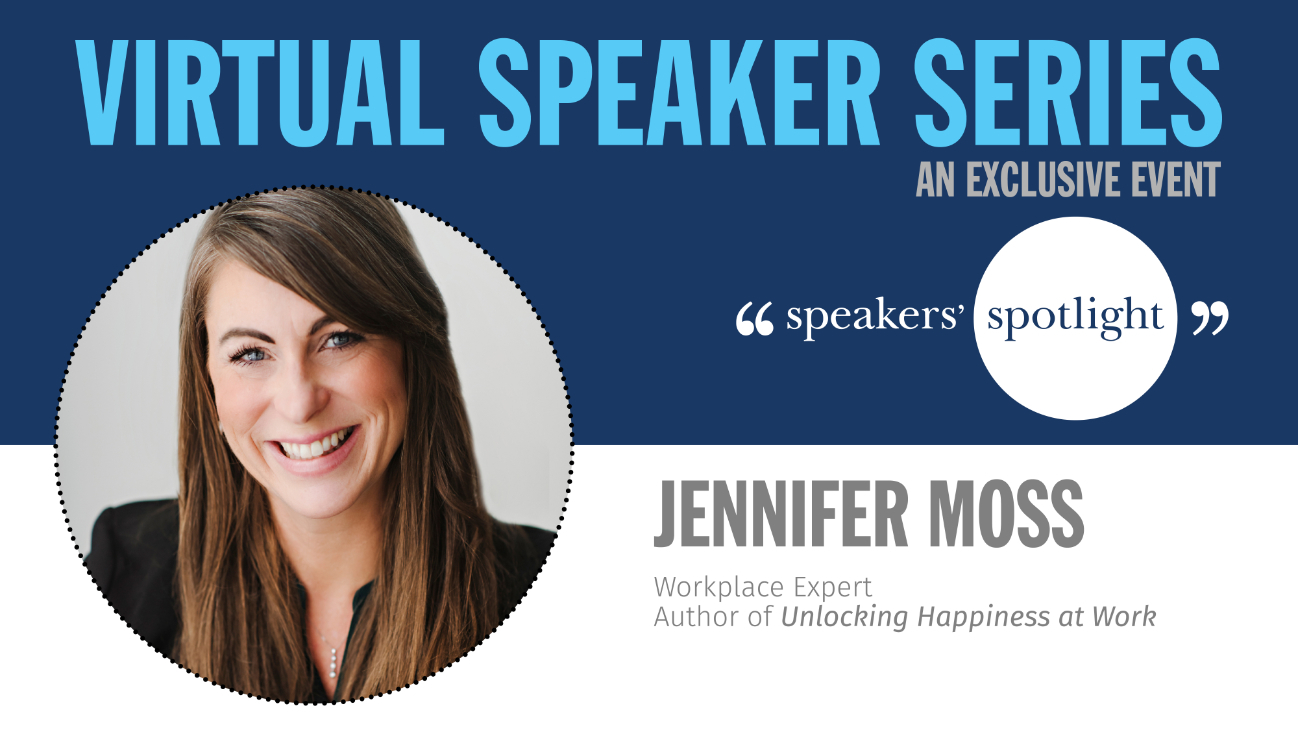Joining us for this week’s Virtual Speaker Series session, Jennifer Moss presented a timely warning on the dangers of burnout and practical advice on how we can work to prevent it. Drawing from the research she’s been doing as part of her next book, The Burnout Epidemic: The Rise of Chronic Stress and How We Can Fix It, Jennifer provided a comprehensive outline of the issues that have been building in standard workplace practices for many years and now are being brought to a crescendo during the COVID-19 pandemic. At the same time, she offered a useful toolkit of approaches that we can use, both as individuals and organizational leaders, to help manage stress and prevent burnout from taking hold.
As well as the summary of her presentation below, at the bottom of the piece you will find some links to helpful information decks that Jennifer has graciously provided to help follow up on this important conversation.
To begin the presentation, Jennifer acknowledged that burnout has been a concern for some time and she began her work in this field long before the coronavirus was a concern. However, the reality of the broad shift to working from home has only compounded much of the strain that many people were already feeling. As she put it, many people felt like “working from home is like living at work” with very little balance between work and home life. Meanwhile we’ve been forced to confront a whole different set of pressures with the sudden change over to working from home while also managing life in the pandemic at the same time. Overall, many people are reporting feeling less and less engaged by our work, Jennifer said. Surveys she has done had found that the majority of people reported their well-being has declined during the pandemic while their job demands have increased, while studies are showing that the average work day has become longer and the number of meetings has increased.
Jennifer provided a quick overview of the six root causes of burnout that she’s found in her work, before moving on to more detailed explanations:
- Unsustainable Workload
- Perceived Lack of Control
- Insufficient Rewards for Effort
- Lack of a Supportive Community
- Lack of Fairness
- Mismatched Values and Skills
While some of these causes are self-explanatory, some are more complex and are worth digging deeper on. Overall, Jennifer wanted to highlight that often what we think of as performance issues – like coming in late, making mistakes, forgetting things, etc. – are usually stress and burnout indicators.
For example, a perception of a lack of control by employees at a workplace is largely rooted in micromanagement. Jennifer said that studies show micromanagement is one of the top three reasons why people leave a job, and yet micromanagement has been driven to higher levels than ever before because of the pandemic. Uncertainty and a feeling of a lack of control pushes us to cling to what we can control, which in turn leads management to overdo it on oversight.
Meanwhile, lacking a supportive community at work covers several concerns. While support from management, both in day-to-day work and in times of crisis, is obviously important, it’s also important that people have the opportunity to develop organic relationships with their co-workers. Jennifer said that in a time when so many people are dealing with increased isolation and loneliness, having a couple friends at work can go a long way to improving our sense of well-being, as well as helping us to manage in times of high stress and even increase job satisfaction.
So, what are some of the things we can do to help prevent burnout and better cope in the long run. Jennifer provided a broad range of solutions and tips, but here are just a few of her insights:
- For managers, try to be more flexible with expectations, shifting the focus from the amount of hours worked from week to week to achieving specific goals. Some great questions that Jennifer suggested managers can ask each week are: “Was this week particularly stressful? What were some barriers that prevented you from accomplishing your goals? What can we do to make next week easier?”
- Be aware of too much screen time and try to actively fight against it. Take daily walks, even putting it in your calendar to prioritize it like you would a work task. Stop having lunch at your desk and try not to schedule meetings for lunchtime. Overall try to set guidelines so that everyone has a clear idea that breaks and downtime are expected and important part of staying healthy and productive. This goes for everyone; Jennifer said it’s best if managers can model this behaviour (this is generally true of all her advice).
- Overall, communicating empathetically is key. Jennifer said that research shows empathetic communication at work increases job satisfaction, reduces burnout, and correlates to a feeling of enhanced well-being. We can do so much by checking in on one another, and especially for managers to do regular check-ins and adjustments to workload and workflow as necessary.
This is just a portion of the helpful advice that Jennifer offered throughout her presentation on fighting burnout and coping with stress. She also provided some detailed and comprehensive follow-up information summaries on Building Psychological Fitness and Developing Resiliency. Armed with all this, hopefully we can strive for a healthier, happier workplace—in our present and the future to come.
Jennifer Moss is an award-winning journalist, author and international public speaker specializing in happiness and wellness at work. Her book, Unlocking Happiness at Work, received the distinguished UK Business Book of the Year Award. Jennifer works with a wide range of organizations on how to develop and measure their happiness strategies for improved performance. Her inspiring and evidence-based presentations help leaders and their teams find joy and grow to become more resilient and successful.
Speakers’ Spotlight has been offering virtual presentations since 2009. We work with a range of speakers who are comfortable with presenting virtually on a variety of topics. If interested, contact us for more information.




